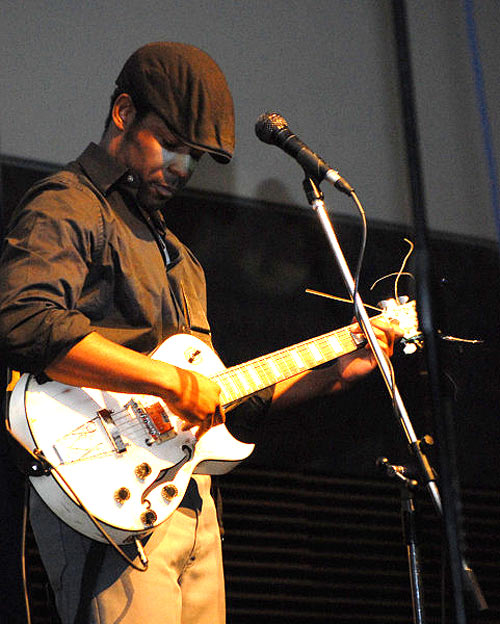Soul Food Dinner showcases black culture at USU
February 20th, 2010 Posted in Arts and LifeStory and photo by Mark Vuong
For Dexter Summers, soul food is both delicious and a way to bring awareness to black culture, food and traditions at USU.
 Friday’s Soul Food Dinner was the culmination of Black Student Union Week, said Summers, the BSU president.
Friday’s Soul Food Dinner was the culmination of Black Student Union Week, said Summers, the BSU president.
“(The event) is just to bring a very unique cultural dinner and presentation to our campus to educate people on our culture who might not be familiar with it—and for people who are familiar with it so they can just enjoy it,” he said.
Musician Amir Jackson offered soul music as participants loaded up on mac and cheese, catfish, fried chicken, collard greens, corn bread and peach cobbler—all of which is “post-slavery food,” Summers said.
Opening with the national black anthem, “Lift Every Voice and Sing,” the event was designed to be laid back, which is why there will be no lectures or formal presentations, Summers said.
The BSU meets Mondays at 4:30 p.m. in the multicultural student services lounge on the third floor of the TSC. The union’s main goal is to promote and raise awareness of black culture—such as food, clothing, language, wedding ceremonies, demeanor—as well as other cultures, Summers said.
There are about 42 official members of the Black Student Union, although not all are black. Meetings are casual and there is no agenda, with members typically tackling topics ranging from African-Americans in the criminal justice system to interracial marriage, what being black means to individuals, to how blacks are portrayed on television and other mass media.
“The people who come to the meeting can be informed of our culture and also hear different point of views,” Summers said. “Our entire club isn’t just African Americans or for black people. It’s for everyone. And so if you’re not familiar with the culture, then you can come and listen and be informed—get some different perspectives.”
Just because people are of the same ethnicity doesn’t mean they have the same perspectives, he said. Meetings are open forums, serving as a congregation for people to bring up topics they otherwise would feel uncomfortable talking about in the classroom or to faculty and staff, he said.
“You may hear different opinions and biases, but it’s really a comfortable situation,” Summers said. “It’s really a family environment, where you can come and be with your brothers and sisters, no matter what ethnicity or background you’re from.”
Most BSU members are from out of state, which also helps make the club unique at USU, because members bring different perspectives and backgrounds to the conversation. Individuals express perspectives representing themselves, not all people of the same ethnicity, Summer said.
“It’s really strong to say that, ‘Because I’m black, everybody feels this way,’” he said, “and that’s not true.”
Summers said he would like USU to become a more multicultural community. The first step, he said, is hiring faculty and staff from different ethnicities and background. The second step is improving efforts to recruit out-of-state students.
It’s hard to sit in a classroom where fewer than 1 percent of the people look like him, Summers said, although he acknowledges that just because a person is of the same color, it doesn’t mean it’s easier to relate.
“When you have a majority of one culture here at USU, sometimes you forget to embrace minorities’ cultures,” Summers said.
TP
NW
Tags: Black Student Union, minorities, Soul Food

Sorry, comments for this entry are closed at this time.